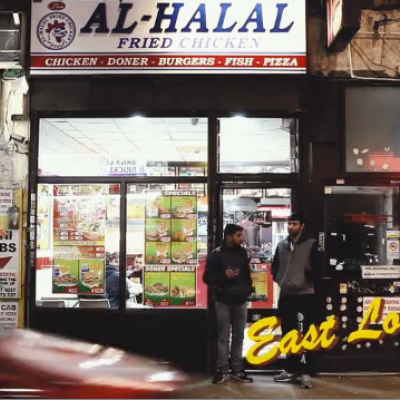Addressing the lack of access to healthy food for people on lower incomes would be of huge benefit to society and the environment. Freelance writer – Daniel Knag spoke to Martin Caraher, Professor of Food and Health Policy at City University, about approaches which could make a real difference in this complex area. Unsurprisingly, the high street is central to this.
Daniel Knag: There’s a segment of the UK population that’s missing out on healthy food.
Martin Caraher: ‘Yes, in the UK, there are four million people living in poverty. That’s one million kids. People in the gig economy don’t know if they’ll have income, so they can’t plan what food they’ll be able to have. There’s data from Oxford that shows if someone cooks next week, it’s not about their skills, it’s about their employment status, which is a better indicator.
People on low incomes have to think about heating the house OR turning on the oven. So fast food becomes an attractive option. Food banks are giving out bags with pot noodles so people don’t have to heat their ovens. Poor people pay what we call the poverty premium. They pay more for their electricity, because they’re on metered keyed systems for electricity and gas. They’re paying up to 15% more. These are the overheads and hidden costs of food preparation.
Poverty is demeaning, it’s the indignity of not being able to put food on the plate for your family, and the attraction of fast food is that it’s hot, energy dense; you know you’re feeding them. Poverty is an indignity. It’s an assault on the poor. People say "if only the poor would spend the £6 a week they spend on fast food on fresh veg instead.” That’s easy for people to say, but not when you’re on a low income. It’s bloody difficult!’

DK: Can you explain what obesogenic environments are in the UK?
MC: 'We talk about food access. In lower income areas, there’s an overabundance of fast food outlets. There’s two reasons for that. One is the business model: it’s called the clustering effect. The basis for that is if one shop’s busy, I’ll go to the other one. The second reason is they locate in areas of lower income because the overheads are lower. They don’t locate in Kensington High Street because the overheads are incredibly high.'
| Chicken can be produced so easily and quickly that fast food outlets can serve food at prices people on low incomes can afford. |
DK: So this leads to the chicken shop phenomenon…
MC: ‘Perfect Fried chicken, or PFCs, are largely small businesses, but they perform a cultural aspect. Many young people eat in these because they’re safe places. They offer cheap food and a place to meet. Often safe, often serving no alcohol, which for many groups is an important option. But the food is pretty worrying in terms of health outcomes. Cheap cuts of meat and chicken that often come from the Middle East or the Far East. It’s imported cheap and food preparation leaves a lot to be desired.
But we do need to recognise why people go there. If we shut them down, what would happen and where would these young people go?
Something like 60% of fast food comes from independents. Usually family-owned in urban areas. The food may not be healthy, but they’re running businesses and distributing money back into the local economy. My concern is if we push them out of business, the major companies just fill their spot with something that’s not necessarily any better. And then we don’t have any local money flows, what’s called an LM3, a local multiplier model. Small businesses will employ local people, they’ll use local services, they’ll buy goods locally. The major companies don’t do that; the money flows out of the area.’
| The kind of fried chicken served up in PFCs is considered ultra-processed, meaning even more of its nutritional value is lost and there may be further health consequences. A large study with over 100,000 participants found that a 10% increase in the proportion of ultra-processed foods in the diet was associated with a significant increase of greater than 10% in risks of overall and breast cancer. |
DK: What can we do to make high streets healthier?
MC: ‘It’s complex. We do need a restriction on opening of fast food outlets through planning regulations, but we need to work with existing outlets to improve their healthy options. Cut down on meat and cut down on unhealthy options. We do need more control on our high street and planning regulations are incredibly weak in the public health issue. People locally need to introduce supplementary planning guidance, taking account of the wishes of local people. A lot of boroughs just don’t do that.’
| Awareness of processed and red meat’s negative health impact is spreading, but there is a danger that cheap chicken becomes the alternative, instead of fresh fruit and vegetables. A chicken only takes as little as 35 days to go from egg to slaughter in a factory. |
DK: Are there good examples?
MC: ‘Waltham Forest has done something. Tower Hamlets has introduced new regulations. But the problem is it’s not retrospective; you’re stuck with what’s there. I think there needs to be a change in planning regulation in terms of class usage. There’s an argument if a business changes hands, people should have to reapply not just as a food premises, but as a fast food outlet. But that doesn’t happen. Once you’ve got a class usage you can continue to use it, which is problematic.’
DK: What are the fundamentals that have to change for poorer people?
MC: ‘There’s one thing, which is better incomes.’
DK: What if incomes don’t rise? Is there anything we can do in the meantime?
MC ‘Yes there are things we can do. Over 30 years the government has pulled back from the food market. Bridging the gap between food prices and incomes has got to be the role of government. One way is to control food as it goes onto the market. In the longer term that’s probably what’s necessary; the government needs to step in and we need more regulation. Particularly on fresh fruit and veg. The whole horticulture industry needs more support.
And consider what they’ve done in Brazil. Rather than a fat or salt tax, a processing tax. Every time you process food you take it away from its raw state so it becomes more unhealthy and worse for the environment. There’s a lot to be learnt from places like Brazil. You’re not denying choice, you’re taxing the things that are bad for health and the environment.'
Mile End Community Project’s video about fried chicken shops in the area, this is definitely worth a watch.
{vimeo code="117131970"}
Eating Better is working with the Food Research Collaboration to examine the chicken supply chain and the factory-reared chickens which account for 94% of birds sold for consumption in Britain.
